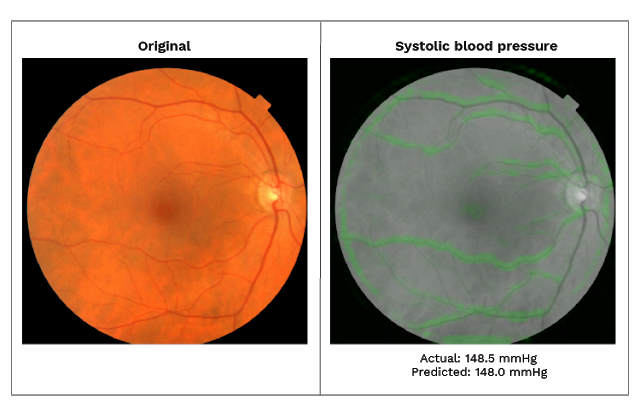 EMERGING TECH
EMERGING TECH
 EMERGING TECH
EMERGING TECH
 EMERGING TECH
EMERGING TECH
Verily Life Sciences LLC, the health division of Google LLC’s parent company Alphabet Inc., today detailed the results of its work applying machine learning to retinal images to identify the risk factors of cardiovascular disease.
The work, which was published in the journal Nature Monday, involved analyzing blood vessels in the back of the eye to predict risk factors, including high blood pressure and smoking.
Verily’s researchers found that by analyzing images of the retinal fundus or interior of the eye with deep learning models, it’s possible to determine the patient’s age, gender, smoking status and systolic blood pressure. That data can then be correlated to predict someone’s likelihood of suffering “major adverse cardiac events,” that is, a heart attack.
Verily used images from almost 300,000 patients to train its models. Using this data, the algorithm could predict which patients would eventually develop cardiovascular disease with a 70 percent accuracy rate. That’s not far behind the accuracy of traditional blood tests, which stands at 72 percent.
“In addition to predicting the various risk factors (age, gender, smoking, blood pressure, etc.) from retinal images, our algorithm was fairly accurate at predicting the risk of a CV event directly,” the research paper noted. “Our algorithm used the entire image to quantify the association between the image and the risk of heart attack or stroke.”
Verily said that one of the most exciting aspects of its research is it can generate “attention maps” that illustrate how its algorithm comes to its conclusions. These attention maps show “which aspects of the retina contributed most to the algorithm, thus providing a window into the ‘black box’ often associated with machine learning,” the researchers noted.

Left: a sample retinal image from the dataset in color. Right: attention map indicating areas that support the prediction for high systolic blood pressure in green, which overlap with the retinal blood vessels. (Images: Verily)
What that means is that clinicians can have much greater confidence in the algorithm, Verily said.
Although the retina scans aren’t quite as accurate as existing blood tests yet, they are advantageous because they’re much cheaper and less invasive. “The opportunity to one day readily understand the health of a patient’s blood vessels, key to cardiovascular health, with a simple retinal image could lower the barrier to engage in critical conversations on preventive measures to protect against a cardiovascular event,” the researchers said.
Support our mission to keep content open and free by engaging with theCUBE community. Join theCUBE’s Alumni Trust Network, where technology leaders connect, share intelligence and create opportunities.
Founded by tech visionaries John Furrier and Dave Vellante, SiliconANGLE Media has built a dynamic ecosystem of industry-leading digital media brands that reach 15+ million elite tech professionals. Our new proprietary theCUBE AI Video Cloud is breaking ground in audience interaction, leveraging theCUBEai.com neural network to help technology companies make data-driven decisions and stay at the forefront of industry conversations.